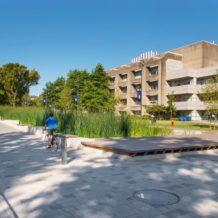Background
Eating and substance use are associated with significant health issues on college campuses. Like sex and other feel good things in life, food and psychoactive substances change the way people feel. And, just as food and substances have benefits, they can also lead to trouble, including problems with health. Campus members experience a continuum of healthy to unhealthy relationships with food and substances. There also seems to be a synergism in the relationship where food and substances intersect which can contribute to increased risk of health-related harms.
When we think about people and their relationships with food and substances, it is important to keep in mind all the factors that can contribute to a person’s choices. A multi-lens perspective helps draw attention to the range of influences ̶ from personal characteristics to broad social factors ̶ that shape behaviours. This orientation can be applied in a variety of settings, including campuses, to help guide responses.
Difficulties around eating and substance use are not yet fully understood. It seems likely that a range of behaviours and contributing factors, including biological, psychological, social and environmental are involved. The co-occurrence of “binge eating” and “binge drinking” is associated with increased risk and harm. In fact many of the behaviours traditionally associated with unhealthy patterns of alcohol consumption (especially problems at work or school and regretted sexual activity) are increased when “binge eating” and “binge drinking” occur together. And, the negative effects appear to be greater than the sum of what is associated with each independently.
While specific eating disorders are largely confined to women, the rates of binge eating are (at least according to one study) comparable for male and female students. And while male students may be more likely to binge drink, female students may be more likely to adopt unhealthy strategies for weight loss.
Some promising practices are emerging to guide a campus response. In regard to concerns around substance use, research has emphasized the need for a comprehensive approach that will both address environmental factors and relate to individual needs. A socio-ecological model of health promotion provides a helpful framework for selecting and directing strategies that can together comprise a consistent, coherent response to prevent, treat and reduce the harm from difficulties around eating and substance use among college students. Within a health promotion strategy, it is important to help everyone avoid problems as well as help those who are already experiencing problems to overcome them.
Promising Prevention Initiatives
- Social marketing initiatives, with sustained effort, can be successful in countering common myths and stereotypes and in promoting positive behaviours
- Educational efforts can reinforce social marketing messages by providing opportunity to critically evaluate various cultural messages and to understand the complex factors that influence our beliefs, attitudes and behaviours
- Healthy public policies can increase the impact of other initiatives while independently promoting healthy lifestyle choices (making the healthy choice the easy choice) and by shaping the institutional culture
Promising Treatment Initiatives
- Addressing the consequences of problems related to unhealthy eating and substance use simultaneously, rather than sequentially, is more likely to be effective
- Integrated systems for screening, brief intervention and more intensive and extended clinical provisions are recommended and tools need to be developed
- Motivational enhancement approaches have shown encouraging results












